We were walking south as the sun set. The gold sheen to the buttongrass deepened; on the mountain slopes, the bare quartzite begun to stand out more, as if it was pushing through the scant layer of vegetation. A glass lagoon reflected the high range we were to cross in a couple days’ time. The moon was winched over the nearest peak, almost full.
A light plane had dropped us on the edge of Bathurst Harbour. We’d floated over the legendary landmarks of southern Tassie and landing in the white dust of a rough airstrip, surrounded by shining plains, the aircraft was like a mosquito alighting on the body of a beast. From where we touched down, you can see a low gap between bluffs. The Southern Ocean roars beyond it. The track races in that direction: it is a scar of bare quartzite, a mosaic of cracked peat, timber boardwalk that looks as if it’s been stapled to the earth.
We were forced to pause before we reached the rush of surf. The bag of wine in my backpack had begun to leak; nearly two litres of claret had drained away.
Twelve years on, I mused to myself, and I’m still doing daft things in the bush.
I could tell you about the exact moment when I decided I’d walk the island’s southern coastline. I was far away, knowing only that I would eventually come home; when I did, it would be necessary to begin a new investigation of Tasmanian identity. Much of this would be done on foot, in remote places. Some of it would be done in solitude.
There are no roads in south-west Tasmania. There is, however, an historic air strip, once used by an old tin miner, now employed in the work of conservationists and the entertainment of tourists. I booked a flight, a one-way ticket to the south-west. I would take a backpack full of provisions and I would walk to the nearest road, more than 80 kilometres away, along the crumbling crust of the coastline.
It was a well-worn route. You could get a guidebook from the library. Along parts of the track were small, triangular waymarkers. Then there were the telltale signs of other walkers’ boots. I knew little of this. This was twelve years ago: I was still so young I assumed that with even the most meagre preparation, I could achieve more or less anything.
Days before I took that flight to the south-west, I ran into a mate. Will was keen to come with me. He had more bushwalking experience, had indeed taken work as a guide, but he was also young.
I won’t speak for Will, but I had no real idea what I was in for. I didn’t really know what you needed for such a journey, what would make it more enjoyable or comfortable, what food to take, how to properly read a map, how far you might walk in a day, what sort of weight I could carry.
Basically, I knew nothing. I think it was the first long, tent-based bushwalk I ever went on. It may ultimately have been very bloody lucky that Will came with me.
In the end, we spent ten days out there – far longer than is needed to complete the walk. The weather was incredible. We took every detour we could, lounged around at campsites, pottered around while others trekked at top speed. We swam a lot. We prioritised improvised versions of beach cricket. Will had whittled a ball out of kelp; we threw catches or tried to bowl down sticks that we’d set into the sand as wickets. We padded out our meals with seaweed, a species which we were pretty sure was edible.
I should be careful recounting stories from my first trip on the south coast. Memory is fickle and whimsical. Will’s version of events may be different to mine. Only recently, a yarn from that walk bounced back to me: we ran out of food, I was told, and had a big argument about it. This may be true but this is not how I remember it.
I remember, more pertinently, that Will repeatedly kneed me in the back one night as we shared the tent – he must’ve been acting out his dream, he later explained, because he’d conjured up a fantasy of playing electric guitar while seated on stage.
Neither of us took many photos, so there are fewer prompts for reminiscences, less evidence for checking back on the facts. I even made remarkably few notes in my notebook – a mistake I wouldn’t make again.
But I remember setting up pots and cups to catch drips falling in a grotto, at an otherwise waterless campsite. I remember having a dram of whisky to console ourselves after a navigation mistake. I remember, still with acute embarrassment, that when it came to rowing across a lagoon half-way along the track, I proved myself to be rather inept with a set of oars.
There were also the bananas that we found strewn in strange positions along the last couple of kilometres of the second-last day – a tale that I’ll have to explain more fully another time.
Will and I are still great mates. We have, perhaps, grown up a bit over the course of a dozen years. Stories from our South Coast trip often come up. We light-heartedly (but seriously) blame each other for our failure to bring enough chocolate and booze. The swims, ball games and bird sightings live on as we recount events from those ten days together. You often hear of young people going on journeys that cement their friendships: it was probably one of those.
Not all memory turns to myth. But certain experiences change substance as they enter your mind; they cast a shadow on everything that comes after them. They become the yarns that give shape to your years on Earth.
The other week, I got a message from another old mate, Molly. She was returning from interstate for a wedding. I was going to the same shindig; we worked out that we could wedge in a bushwalk together before the party.
And I had been meditating on that southern coastline for a while. I’d travelled there by boat a couple times in the past twelve months, popping in at a few beaches, walking short distances, bird-watching and picking up marine rubbish. One night recently, I had a dream of the first campsite, which is on a bight that faces towards some monumental islands. A dream can be harder to ignore than the prompts of real life.
For me, returning to places is an important practice. You can not only get a sense of how the world is changing, but to return is a poignant chance to measure the changes within yourself. Thankfully, Molly was keen to do the same walk. So we booked our flights impulsively and buzzed over the mountains to Bathurst Harbour.
Then I wondered how the south coast, in reality, would match up with the south coast in my memory.
I knew that my bushwalking nous had got a whole lot better; I was sure I would be adequately provisioned this time, that Molly and I would have the important things. Which is all the more reason why I was so gutted to see the wine pooling in the bottom of my pack.
There is an unruly fringe of bush through which you have to push to reach the beach on that track. It was deep dusk when we got there. You could hear the surf surging, charging in from miles away. You only have to briefly do combat with the dogwood and coastal wattle, and then you arrive. It is a moment of power, the land ceding to the ocean. I had no memory of it from the first time round, none whatsoever.
A dozen years is a long time. We can never know how many more multiples of twelve we’ll be given, though we know that they grow ever fewer. There are places to which we will never return. Eventually, we will never be able to go back anywhere again.
Molly and I also had fortuitous conditions. There was some rain and fog, but you often get much worse than this at that latitude. And as it had been with Will, it felt like sharing my time with Molly in such a spectacular place might well have immortalised our friendship.
We had to travel faster than I had on my first trip down there – there was that wedding to get to. So we rattled along at a fair clip and got it done in six days. We stomped through perma-bog, dunked ourselves in the waves, trudged up stony slopes. With an oar each, we rowed across the lagoon – a much shorter voyage than I remembered, although I still must say it’s not my strength. Fairies’ aprons and sundews flourished in the mud; the green forests were decorated gaily with correa flowers. Ground parrots erupted from the tussocks and crescent honeyeaters cheered us on. We cooked simple meals of pasta and noodles. Every campsite was stalked by spotted-tail quolls, had a Bassian thrush as its caretaker.
Certain vistas, beaches or forests provoked flashbacks, but much of the track was surprising, as if it was all new to me. Some of the hardest sections were like blank canvases stretched over my brain. But it wasn’t just about seeing leatherwood trees, conglomerate bluffs, Neptune’s necklace. I was there, also, to observe the unseen within myself.
When we reached near to the highest point of the walk, two black cockatoos flapped towards us, as if from somewhere on the ocean. They went in the direction of the myriad blue mountains, jagged and idiosyncratic, which seem to be laid out endlessly to the northward. When I was there twelve years earlier, I was familiar none of them, but I knew that I would need to make acquaintance with some of that mysterious south-west country if I was to get a real feel for this island on which I was born.
By the time we made it back to the road, on that walk in the summer 2013, I had a clearer vision as to the life that I should have.
It is a project that isn’t yet completed, of course, but as Molly and I stumbled down the final rocky steps into the campground at Cockle Creek – where a mate was waiting to drive us to the nearest pub meal – I took stock of how much had come to pass in the years since Will and I first finished up that walk.
I had the sense that there had been another track that began where the trail along the southern coastline finished, all those summers ago. I realised that I had stuck doggedly to that path, over the ranges, across the boggy plains, through thick bush. That I had never once baulked at fording the dark creeks flowing fast with cold water, though I may still still get flustered at rowing across a tannin-dark lagoon.
Finishing the walk last week, I saw that other track stretching out still, curving over the hills, into beautiful country beyond view.





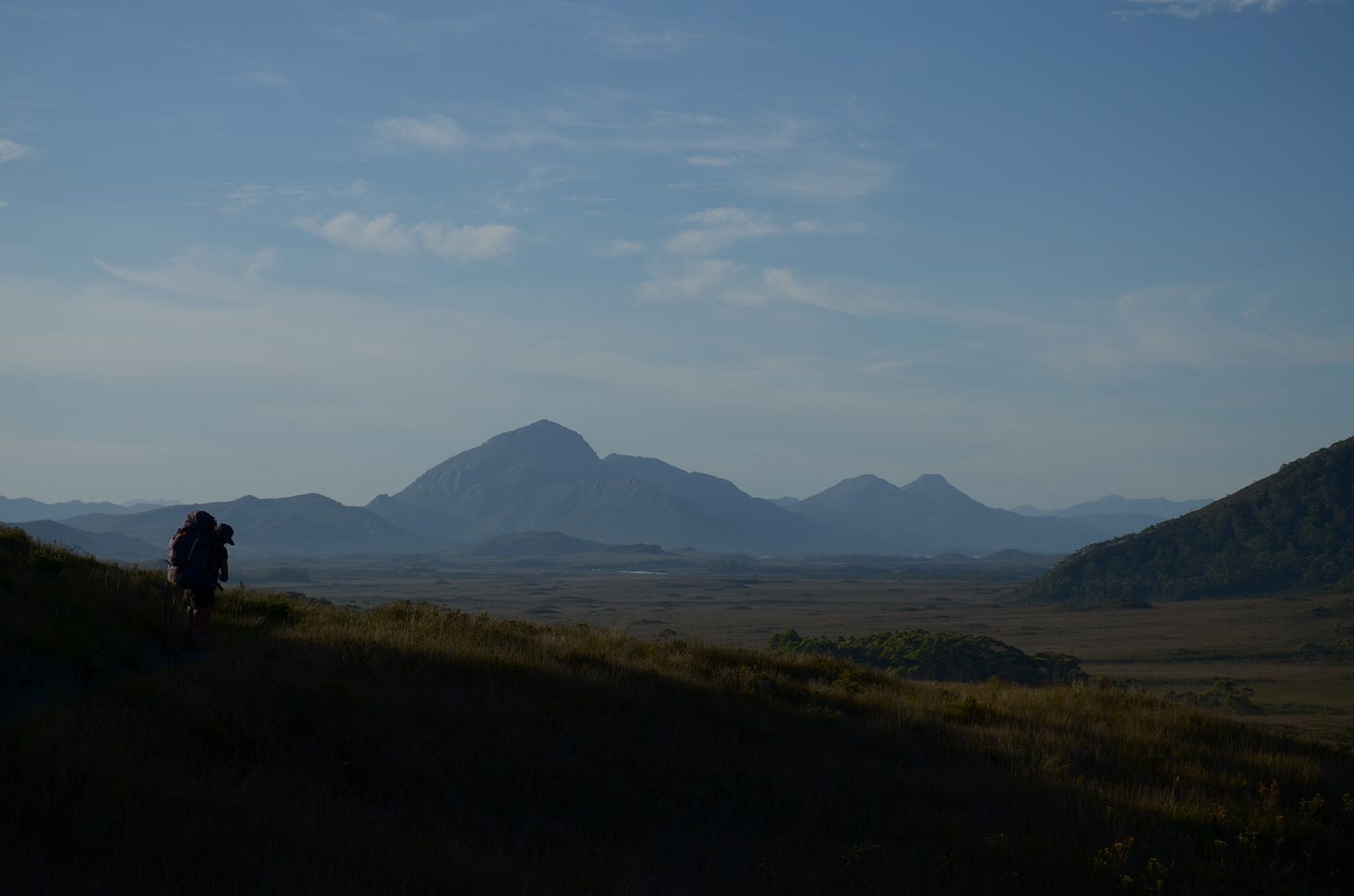
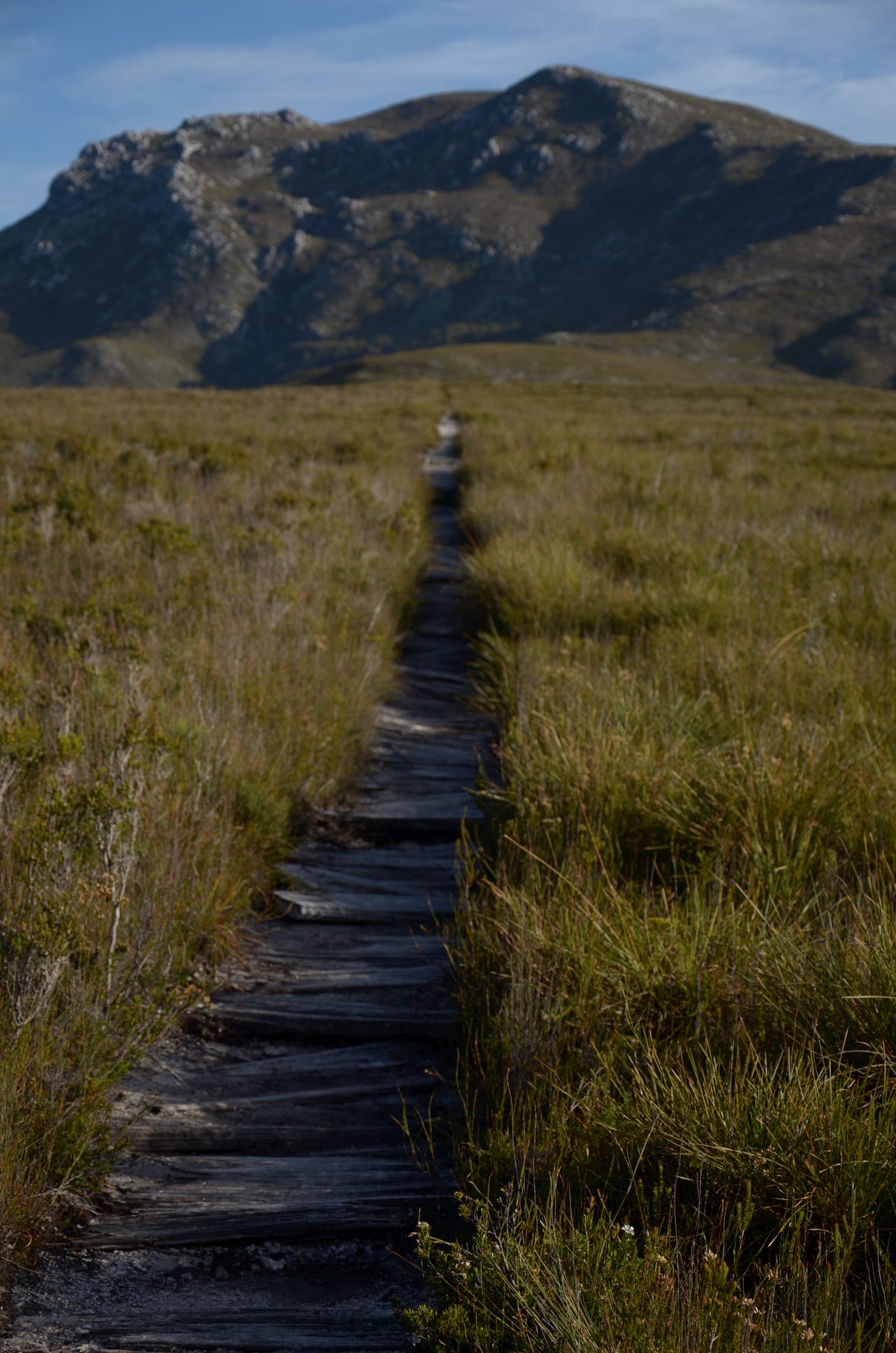
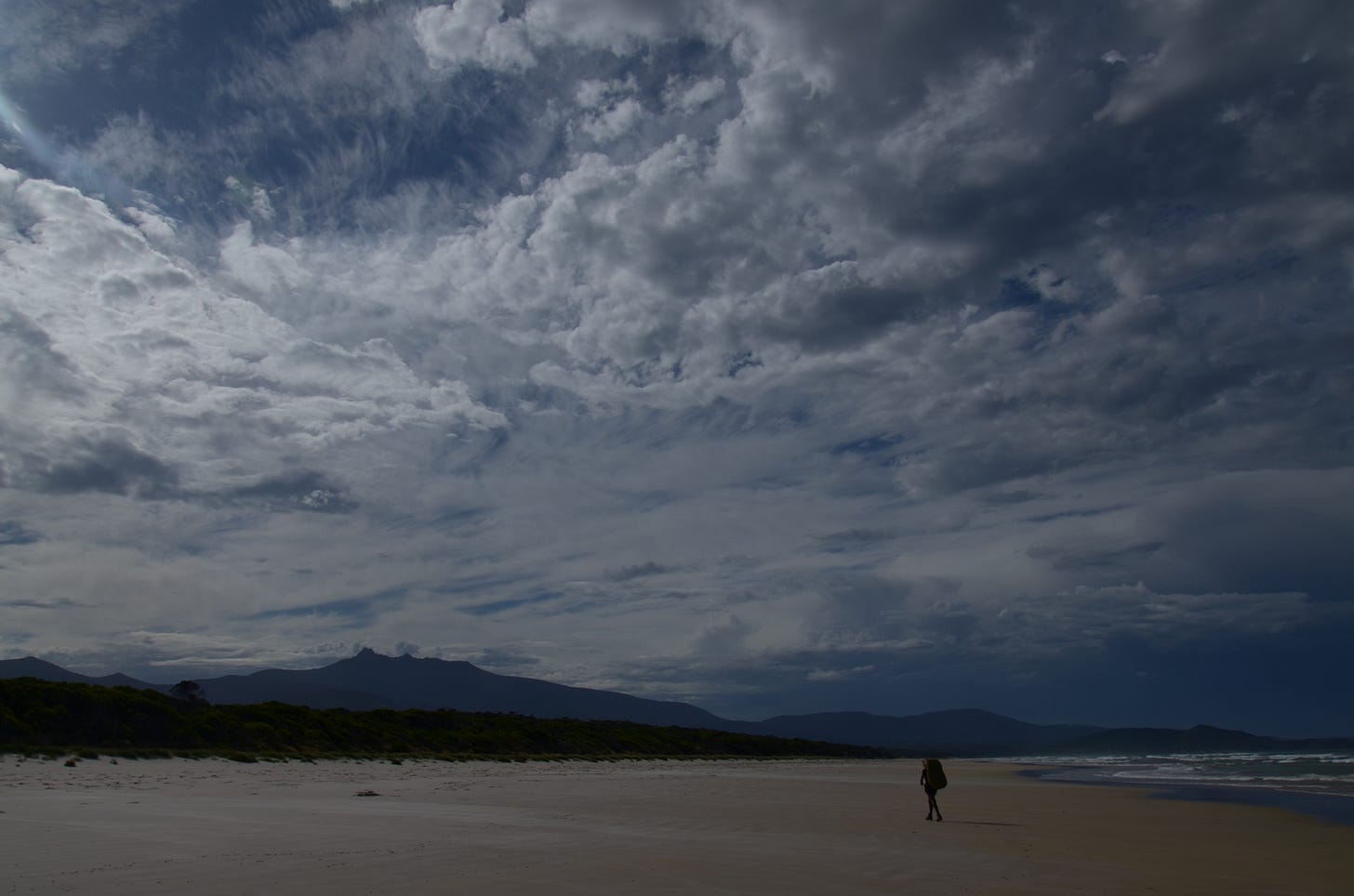
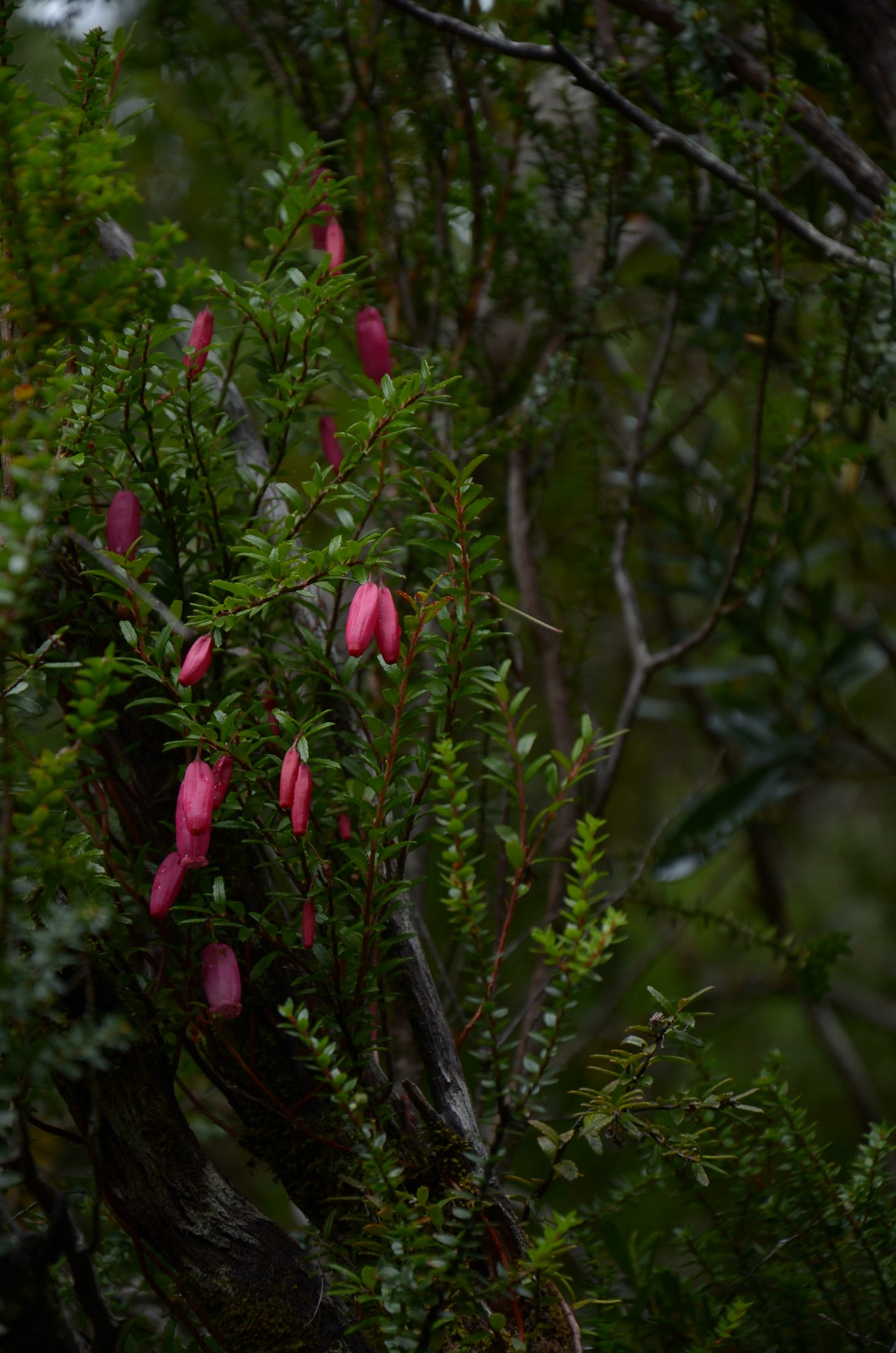
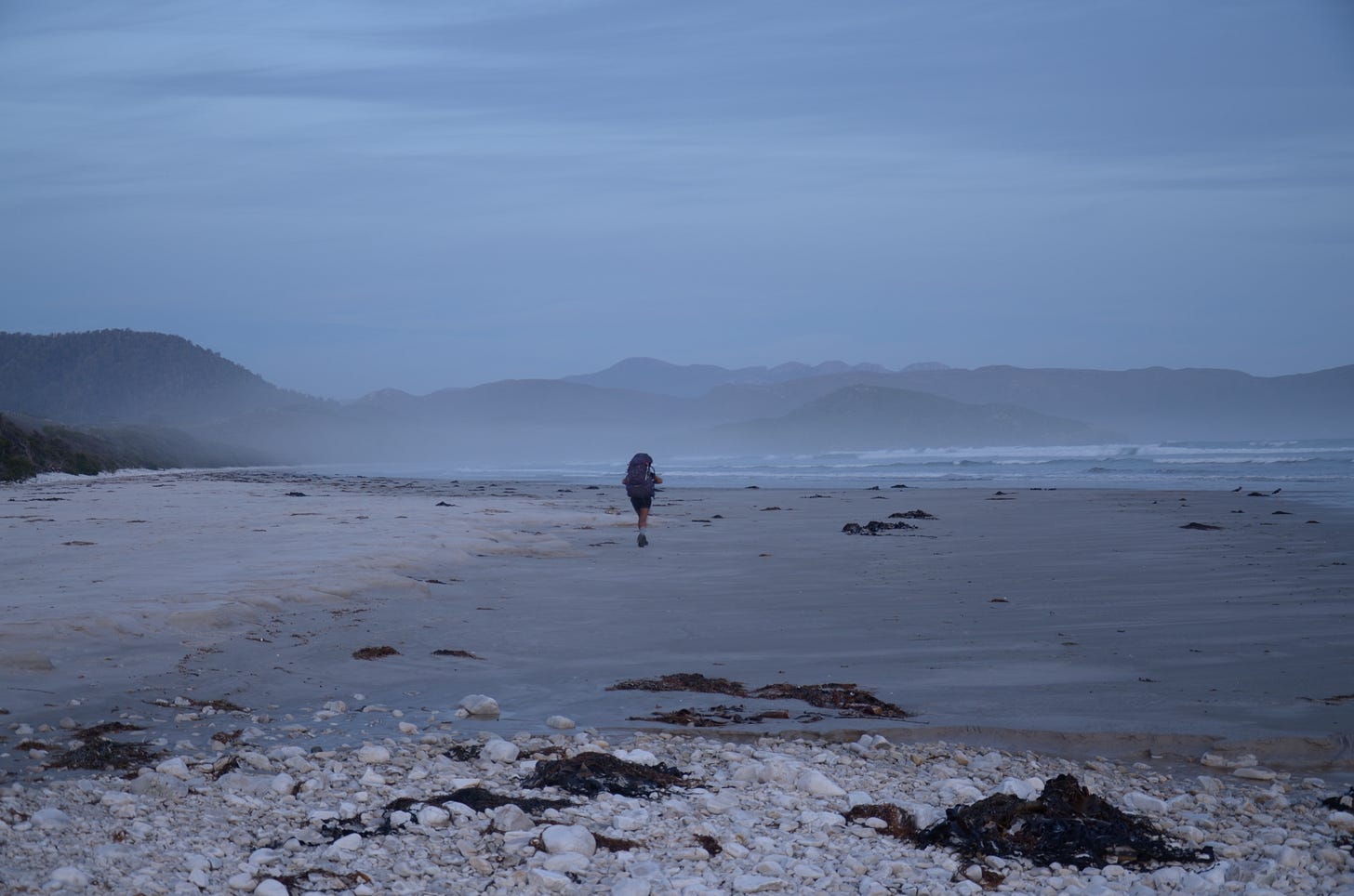

Photos and words are lush, thanks Bert
Wonderful. I want to talk to you about I - to compare perceptions.